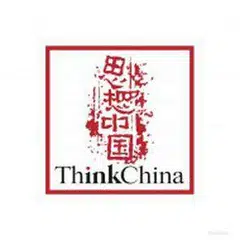Lee Hsien Loong: The world cannot afford a conflict between China and the US
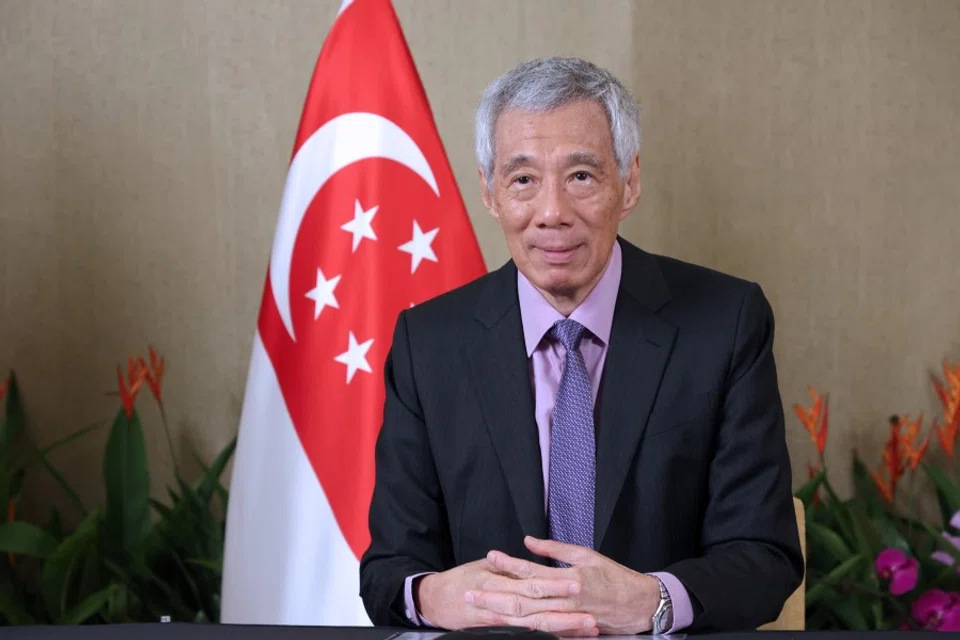
Esther Zou Yun, Leaders' Talk host, CCTV (EZ): Your Excellency, Prime Minister, thank you so much for joining us today. China's Two Sessions, the political season, has been successfully concluded not long ago, and you have sent congratulatory letters to Chinese leaders. What do you think is the significance of this year's Two Sessions?
Prime Minister Lee Hsien Loong (PM): Very importantly, you have settled the leadership team for the next five years. I have written to President Xi to congratulate him on his re-election, and Premier Li Qiang to congratulate him on his election. I have met him before when he was party secretary in Shanghai, so I am looking forward to seeing him in his new capacity and discussing with him how we can take our cooperation forward.
For China, your Two Sessions are very important occasions for setting the agenda and debating the direction of the country. I think the direction has been quite clearly defined in the speeches, in the statements and the interviews that the leaders have given, and we look forward to China implementing this, continuing to prosper and continuing to develop good, mutually beneficial relations with the rest of the world generally, but especially with Asia, and of course, with Singapore.
Longstanding Singapore-China cooperation
EZ: When you met with Chinese President Xi Jinping last year in Bangkok, President Xi described the bilateral relations between China and Singapore as forward-looking, strategic and exemplary. He also emphasised that high quality should be the hallmark of this bilateral cooperation. So, Mr Prime Minister, how would you define the bilateral relations between the two countries? Also, how do you think this very distinctive feature of high quality can be pursued and brought forward?
PM: I think we have very good relations. They are broad and encompass many fields, and we have been working together for many years. We established diplomatic relations in 1990, so that was 33 years ago, but in fact, we had cooperation for many years even before that, so we know each other well. I think that there is trust and mutual understanding. We have our different perspectives on issues, but we work with one another, and we have been able to get very substantive projects going.
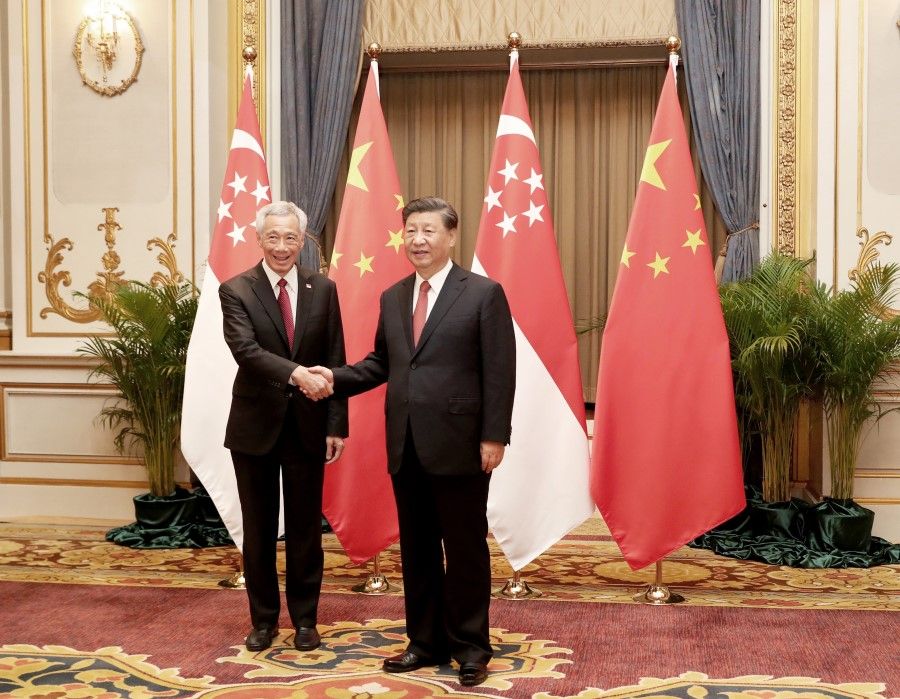
We have what we called Government-to-Government (G-to-G) projects. The first one was the Suzhou Industrial Park (苏州工业园), which is celebrating its 30th anniversary next year. This has been a very successful project. In fact, it has been ranked the best economic development zone in China, now seven years running, so it has amply fulfilled the hopes we had when we launched the project. Then we had the Tianjin Eco-City (天津生态城), which I think you have visited.
EZ: Yes, as my very first story as a journalist when I started working.
PM: I think that was some years ago, but now it is (in its) 15th anniversary, and it is fulfilling a role, demonstrating and trying out ways to make a city sustainable and eco friendly, which is important for China and important also for the world.
The third G-to-G project is our Chongqing (重庆) connectivity project, the integrated land-sea transport corridor, which goes from Chongqing (重庆) into Guangxi (广西) and to Beibuwan (北部湾), and that fits in with the Belt and Road Initiative and helps to provide a new link between the interior of China with the outside world. You have a link down the Yangtze River, down the Chang Jiang (长江), but that is some distance and also, it is very, very busy. So an additional link, shorter, faster, out to Southeast Asia and to the rest of the world - we think it makes a significant contribution to the Belt and Road idea.
So I think we have good projects. The private sector, of course, has very extensive cooperation too, because Singapore is one of the biggest sources of investments from foreign countries into China. There is very intense back and forth, and not just into China, but nowadays with the Chinese companies increasingly investing out of China. Many of them are in Singapore, I think thousands of them are in Singapore. During Covid-19, all that to-ing and fro-ing had to be done online, which is not bad, but not the same as being physically there. Now that we have opened up again, there is a lot of pent-up demand, so I think with flights already resumed and building up progressively, the relations will prosper considerably.
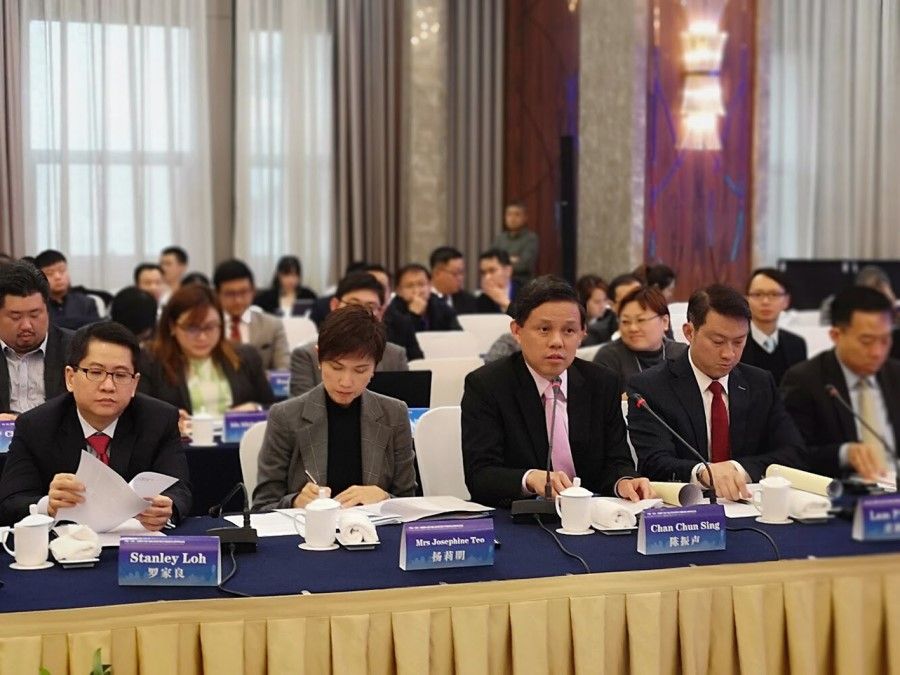
Also, we have specific things to do. For example, we have the FTA with China, which we have revised once before, and it is being reviewed again. We are having Subsequent Negotiations, which we hope we will be able to complete before too long.
The BRI, we saw it as one way China could contribute to the development of the region and therefore integrate itself into the regional network of cooperation and interdependence, and therefore be welcomed across the region in a win-win way.
Much potential under the Belt and Road Initiative
EZ: The projects that you just mentioned - the new International Land-Sea Trade Corridor, the Suzhou Industrial Park, Tianjin Eco-City - actually those projects are now playing a demonstration role under the Belt and Road Initiative (BRI). Singapore is the very first nation among ASEAN members to publicly express support for the BRI. What has prompted this country to express its support at a very early age? What kind of opportunities do you think this initiative will usher in for not only Singapore, but also the region?
PM: We supported it because we saw this as a good strategic move by China. China is growing, China is prospering, China's place in the world is becoming more important. How China integrates into the region and with the world is very important, because if it is not well managed, there can be frictions, there can be tensions, it can be very difficult.
The BRI, we saw it as one way China could contribute to the development of the region and therefore integrate itself into the regional network of cooperation and interdependence, and therefore be welcomed across the region in a win-win way. The region needs infrastructure, the infrastructure needs financing. China is capable of doing that - of building infrastructure, it can also help to provide financing, it can also develop trade and economic links with the countries in the region. With the BRI, there is a framework within which this can be done.
It is not the only links which the countries in the region will have, because we also do business with other parts of the world, with America, with Europe, and we will also have investments and trade with all parts of the world. But with China, within our region, the biggest economy, it is important that we develop that relationship in an open, sustainable and, I think, mutually beneficial way. So we saw the BRI from that light, and therefore we decided that we should say, "yes, it makes sense, we support it".
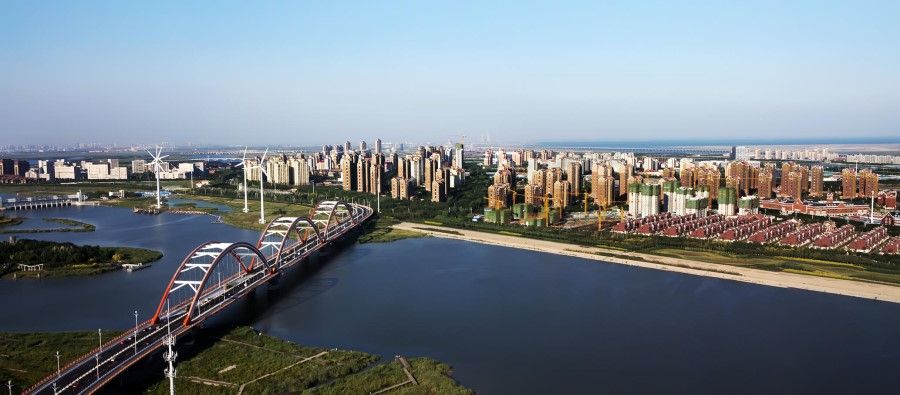
From Singapore's point of view, what do we contribute to the BRI? First, we are a financial centre, so it could be one place where projects have financing and where projects can be evaluated. That is an important piece of the infrastructure, the soft infrastructure, for the scheme. And in fact, Singapore is one of the biggest trading centres for the renminbi (RMB) internationally. That is one aspect of it.
There is also the legal aspect of it, because we are a centre for arbitration and mediation. We have many international law firms operating in Singapore. Countries on the BRI schemes, if they are looking for places to arbitrate their issues or to find legal expertise, we can be one of the sources to meet these projects' needs. That makes sense for us also.
Thirdly, in Singapore, many companies find us a convenient place to set up what they call "control tower functions".
EZ: Control tower functions? What do you mean by that?
PM: That means their headquarters, their fiscal management, their human resource management and their oversight of operations all around us, maybe sometimes on a very big footprint throughout the region. If some of the companies would like to set up here, and therefore from here, be able to manage their operations in Southeast Asia better, I think that is good for them, and we are happy to have them.
EZ: Is this what you would call win-win, right?
PM: That is win-win. As for the Chongqing project, I think the benefit is the connectivity part of it, which means from the interior of China to connect out to Southeast Asia, and from Southeast Asia to the rest of the world. If that can be made smoother, not just the distance, but also the paperwork and administration, so that you can flow conveniently from Chongqing all the way out to the sea, to our port and then you are off, saving days, time and overheads, I think that makes a big difference to the development of the interior of China. You have talked about 西部大开发 (China Western Development) - this is one aspect of it.
To us, because companies in the region want to do business with that market too, so it makes sense.
China and ASEAN enjoy good relations
EZ: let us talk a little bit about China-ASEAN relations because these relations have now entered the fast lane in recent years, with remarkable progress being made, with both sides becoming each other's largest trading partner, with trade volume increased by about 100 times from 30 years ago, and direct investment exceeding US$310 billion. Astounding achievements, I would say. And now both sides are pushing for a kind of an upgrade for cooperation, which is known as Version 3.0 FTA. So what role do you think Singapore could play in this process?
PM: We are one member of ASEAN; there are ten members. We are nearly the smallest, so we have a modest conception of our role in ASEAN, but we will participate in it fully and try to help it to move forward.
Between ASEAN and China, we have an FTA which goes back all the way to 2002. In fact, it was probably the earliest foreign FTA which China completed. It is in the process of being upgraded, just like the China-Singapore FTA, and I think that is one major initiative.
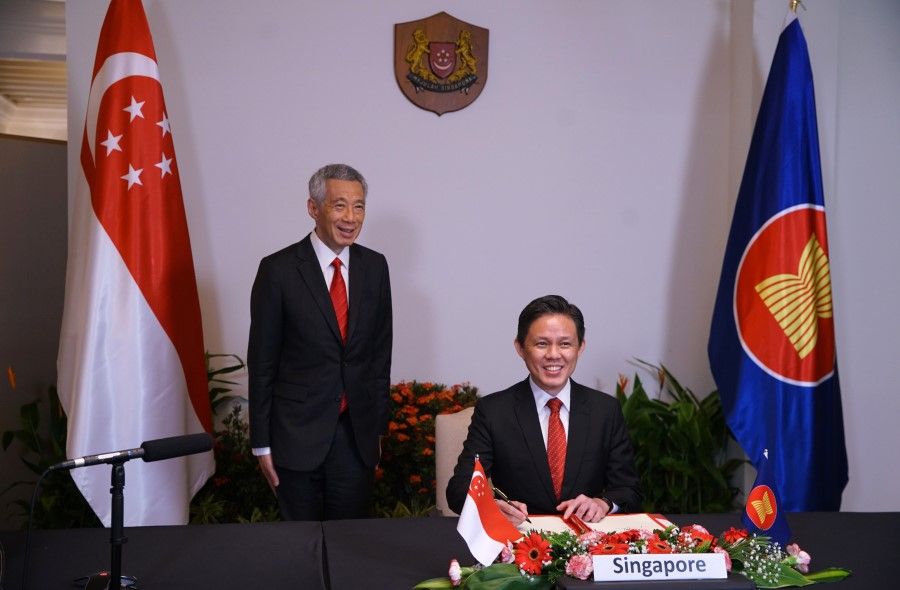
You asked how Singapore can help - apart from participating in ASEAN, one of the ways we help is by showing the potential of what can be done. We have a Singapore-China FTA, it has agreements and provisions, and there is an ASEAN-China FTA. I think when you are negotiating with one country, it is not so complicated as negotiating with a group of ten, and therefore you can go faster and further, but it shows what can be done. Therefore, it is an encouragement when working with ASEAN, to say: "Look, it is possible, Singapore has done it, we have found it good, China has found it workable, why not think about it?" So that is one way in which Singapore can help to push the ASEAN-China cooperation forward.
If we can make more progress on that and manage the South China Sea issue in a way which respects the interests of both sides and all countries big and small, I think it makes it much easier for economic cooperation to go much further.
I think ASEAN-China economic cooperation also depends on the overall relationship. Because between China and ASEAN, it is not just economic issues, but you also have discussions on political issues and security issues, and there are some problems which need to be worked upon. The more progress we can make working on these problems, I think the easier it will be for us to make further progress on economic cooperation.
For example, we are discussing the Code of Conduct in the South China Sea. And that is something which is not easy to work out, but we have been working with it and we hope to make further progress. If we can make more progress on that and manage the South China Sea issue in a way which respects the interests of both sides and all countries big and small, I think it makes it much easier for economic cooperation to go much further.
EZ: Because when you have a solid base that consists of political factors or the security factors or all the factors combined, which will provide a solid foundation to propel the economic relation.
PM: Because the economics on their own, we can make win-win arguments, but it is much easier to be convinced by win-win arguments when the political relationship is good. Otherwise, there will be many win-win opportunities which you may or may not be able to take advantage of.
Between America and China, for example, I think that is one of the issues you have now, because your relations are tense. Therefore, even when there is opportunity to work together, for example on pandemic cooperation or climate change, it is not so easy.
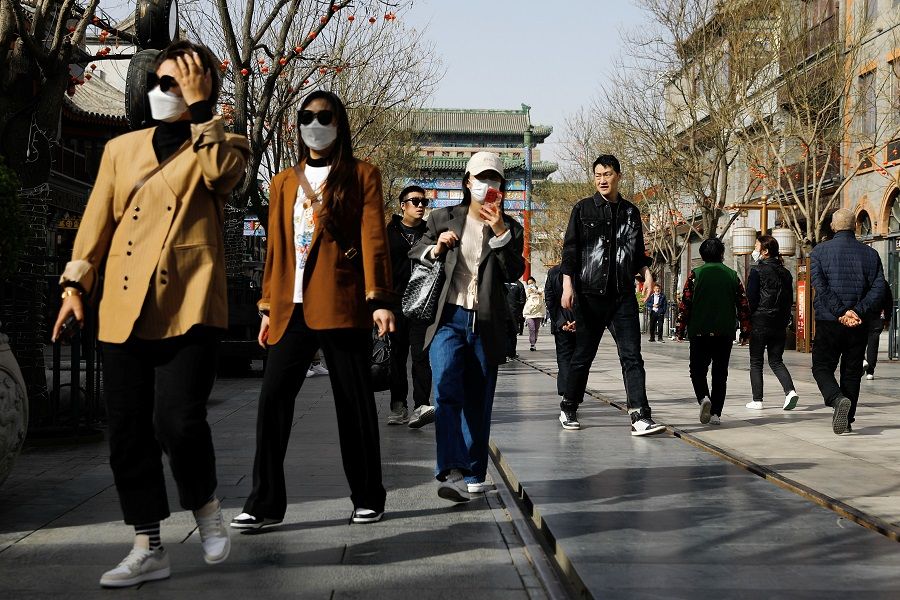
Between ASEAN and China, the relations are good. But the more we can deal with the non-economic issues well, I think the more the economic relations can prosper. And it works the other way round too - if we can have good economic ties, I think there is more incentive for us to resolve the other problems.
Rising China and its impact
EZ: I agree. China's rise is interpreted differently in various countries. The overwhelming majority of countries believed that it is not only beneficial to China, but also the rest of the world, but a few still unfortunately see China's rise as a threat. And I know you once said that it is a good thing that China's influence is growing. Now the question is, how do you think China's rise can be better accommodated in the global system?
PM: I think it is a very major change to the global system. China, which used to be maybe 2-3% of global trade, you are now 15-20% of the global trade, you are 18% of the world's GDP. It is a tremendous transformation internally for China and externally for the rest of the world.
From a dispassionate point of view, it is good that 1.4 billion people have much better lives now. But from an operationalising point of view, how do we make this transformation work without generating tensions and misunderstandings and difficulties which can create new problems which will be very hard to resolve? And that needs a lot of statesmanship, a lot of give-and-take, a lot of cooperation with other countries, and adjustment on both sides, because other countries must be able to accept that China today is not what China used to be. It is much more prosperous, contribution to the world economy is much more, and its voice in international affairs is much more.
China has to be able to recalibrate its position in the world. And that is not easy to do on both sides. But I think it is absolutely essential to do because the world cannot afford a conflict between China and the rest of the world, and in particular between China and the US.
But at the same time, China must also be conscious that the arrangements which worked when you were much smaller, and countries could say, "Well, this is a developing, not so advanced economy, and therefore we can cut it some slack and make some concessions, and therefore allow it to do things which are an extension of the rules which generally apply".
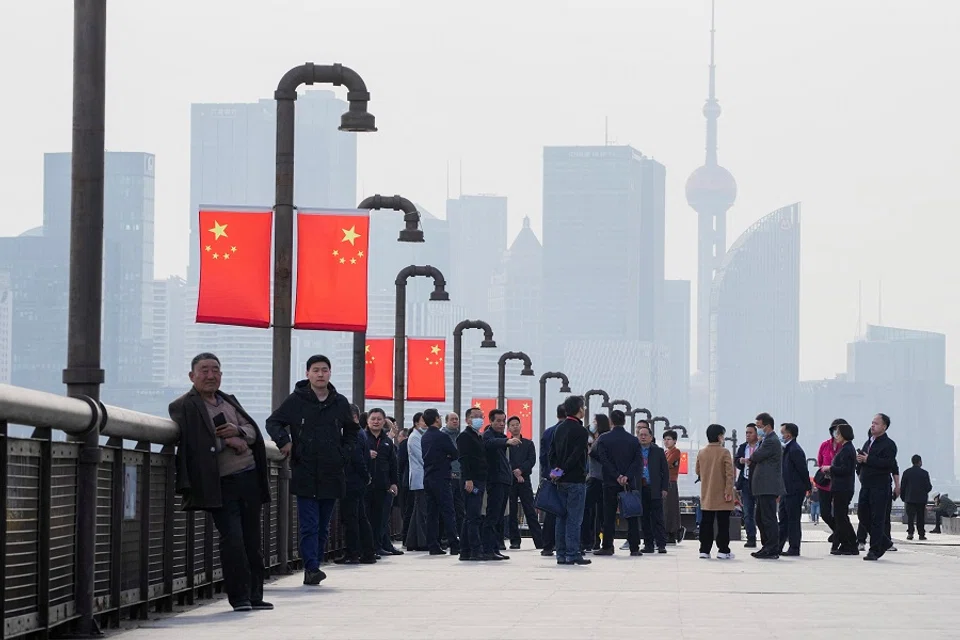
I think some of those concessions need to be reconsidered, and China has to be able to recalibrate its position in the world. And that is not easy to do on both sides. But I think it is absolutely essential to do because the world cannot afford a conflict between China and the rest of the world, and in particular between China and the US.
EZ: What kind of vision do you have for the relations between China and the US, given that now, that is, we could say one of the most important bilateral relations, not only concerning the two countries, but also countries around the world?
PM: I think you have to take things step by step, and stabilise the relations and then gradually build trust, and gradually try to move forward. I know that President Xi and President Biden have spoken to each other, they spoke online and they met in Bali. And Anthony Blinken, Secretary of State, was due to visit China and that had to be put off. I hope that their contacts will be able to build. And that the situation can be stable, and no mishaps will take place. And then gradually, you can improve things. But it will take time. It is not easy and there are political pressures on both sides.
Remembering Lee Kuan Yew: Singapore keeping up with the times
EZ: Talking about China-Singapore relations, the one person we have to mention is Mr Lee Kuan Yew who is the founding prime minister of Singapore and also an old friend of the Chinese people. In an exclusive interview with CCTV back in 2005, he said that China's growth and its rise will bring strong impetus to Southeast Asia. He also said, "Singapore will perform the role of base to understand Southeast Asia." So now about 20 years later, as his son and also the prime minister of Singapore, how do you understand his words? What vision do you have for the future of your country?
PM: There is no doubt that China's rise has been an enormous benefit to Southeast Asia. Nearly every country in Southeast Asia has China as its biggest trading partner. Singapore does too. That is a tremendous economic opportunity. I think Singapore pays disproportionate attention to this, and in the early years, we were perhaps moving faster than the others in developing the economic relationship, but as the other countries have established their links and as China has progressively expanded its network, now China has its network with all the countries in Southeast Asia in its own right. You deal directly with Thailand, Malaysia, Indonesia and all of the countries.
So what is our role? I think for your companies, there is a value in working with Singapore and through Singapore, managing their presence in Southeast Asia, as I explained just now with the control tower functions and headquarters activities; the financial activities through Singapore are significant. Also, I think, Singapore, we articulate more explicitly what is at stake in developing the relationship with China in maintaining peace, stability and prosperity in this part of the world. We hope that by speaking up that way, we can exercise some modest influence to encourage countries to think about the opportunities and risks in the international scene, and work together to take advantage of one and avoid the other.
So how to remember that some things do not change - that we are still small, we are still vulnerable, we still have to work hard, we still need to make friends and we still need to stay together as one Singapore? That is something which we work at.
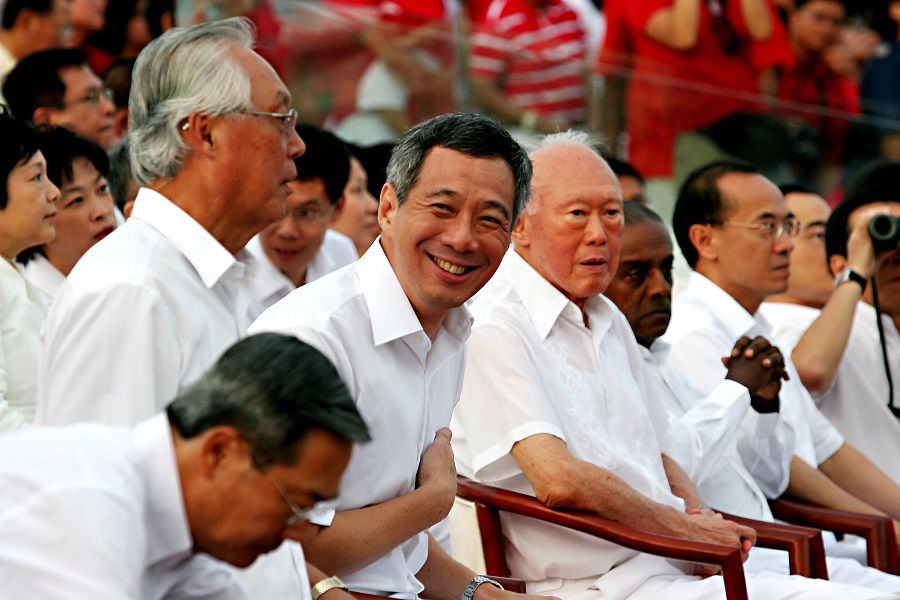
EZ: What vision do you have for the future of your country as Mr Lee Kuan Yew's son and also the prime minister of Singapore?
PM: We have built a country which has increasingly had a sense of nationhood and identity. It has prospered now for more than one generation, and what we would like to see is that it can continue to evolve and develop into the future, keeping up with the times, but at the same time maintaining the values, instincts and culture, which have made us unique and successful. So that is quite hard, you have to keep up with what is happening, but at the same time, you must not forget what made this place tick.
Sometimes when you have something new happen in the world, you think, "wow, the world has completely changed", and then you think maybe we can forget about all the old issues and concerns which we had, which we took account of as we came here, and that may or may not be true. So how to remember that some things do not change - that we are still small, we are still vulnerable, we still have to work hard, we still need to make friends and we still need to stay together as one Singapore? That is something which we work at. We work at it in our schools, with our national servicemen when they serve in the army or in the security forces or civil defence forces, but it is something which you have to keep on conveying from generation to generation. If we can do that, then Singapore will be successful.
Survival tactics of small countries
EZ: Singapore has also played a very unique part in regional and international affairs. Now the world is faced with so many unprecedented challenges and changes, so what role do you think Singapore could play in the current global system? Also, Singapore has supported and participated in the Global Development Initiative (GDI) which is proposed by China. In which way do you think GDI could help in addressing the ongoing global challenges?
PM: Well, as a small country, we do not determine world affairs. We have to take the world as it is, but we speak up, and we make common cause with other countries and therefore hopefully, our voice is heard.
We stand up for a rules-based international system. We stand up for fundamental principles of the UN Charter. When Ukraine was invaded, we had to say very clearly that this was against the UN Charter, this was a violation of territorial integrity of a country, and we opposed it. In fact, we imposed some selectively targeted sanctions on Russia.
It is not that we are hostile to Russia, or are Russia's enemy, but we cannot stand for such conduct. That has always been our position - whether, on one occasion, when the Americans invaded Grenada, we took such a view at the UN, and on other occasions, we have done that too, consistently.
Because if you do not speak up, and one day something happens to you, who is going to speak up for you?
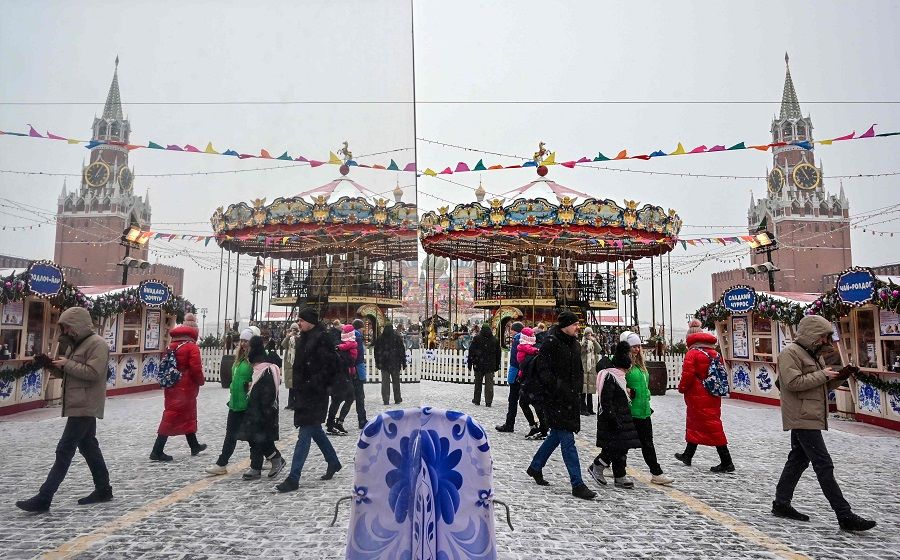
These are fundamental principles which we have to stand up for, and we have to speak up. I think, speaking up for an international order, which enables countries big and small, to compete peacefully and coexist together. I think that is very important. Because if you do not speak up, and one day something happens to you, who is going to speak up for you?
So we have to speak up for the international order, we have to work with other countries. And we make friends with countries, big and small. We go on principles rather than sides, so we have to follow the principle and be consistent and stand by it.
I think that has served us well. We are friends with China, we are also friends with Europe, we are also friends with America. And we hope to remain that, whatever the state of the world.
EZ: What about the GDI? How do you think that helps?
PM: We are a member of the Friends of GDI group. We think that the objectives of the GDI, which are consistent with the Sustainable Development Goals of the UN, are good ones. We think that they can be implemented in a way which is pragmatic, which is inclusive, which is open, so we are in support of this, just as we are in support of other initiatives and other groupings. They do not always include everybody, but if they can help to promote development and cooperation, it is worth pursuing.
Related: Singapore Prime Minister Lee Hsien Loong: The world will not split into two, but neither can it return to the past | Chinese ambassador to Singapore: In a tumultuous world, what should we do? | Heng Swee Keat: Singapore and China will build better future for region and the world | Exclusive interview with new Chinese ambassador to Singapore: Six dimensions of China-Singapore relations | Singapore DPM: Singapore can help to better connect China with Southeast Asian markets
